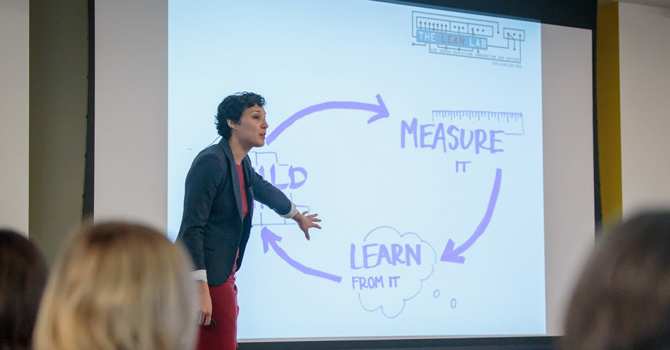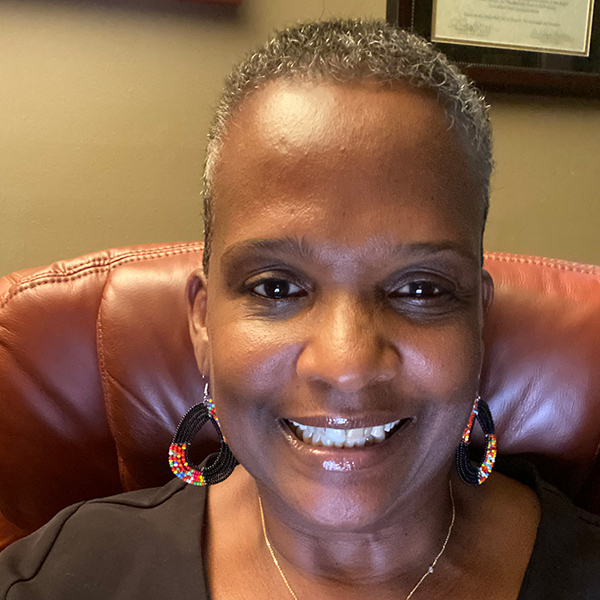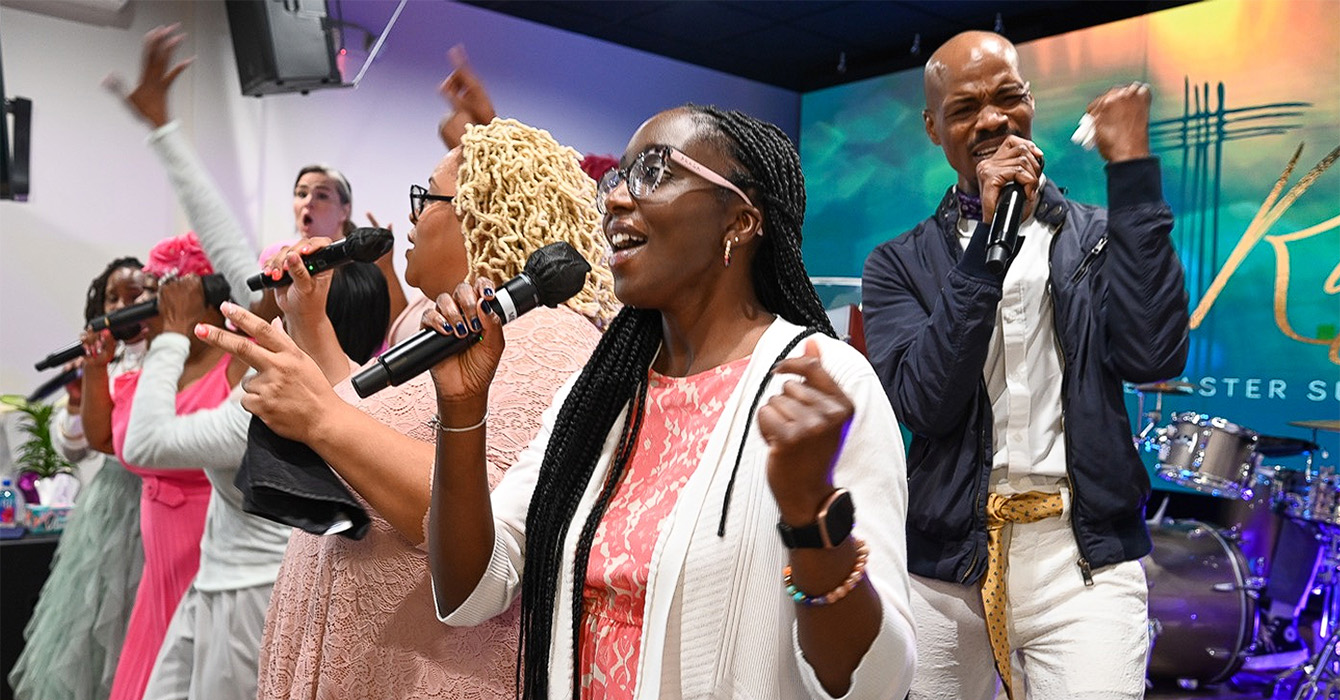Katie Boody chose a tall mountain to climb when she decided three years ago to take on the problems of urban education. Educational institutions are, after all, known for their layers of bureaucracy and resistance to change. Teachers often feel frustrated and hopeless, as Boody, a former school teacher and administrator, well knew. Bringing about change -- transformative change -- would be no easy feat.
But Boody and her associate Carrie Markel believe they are beginning to do just that by taking a page from the tech startup playbook. Together, they created The Lean Lab, an innovation incubator in Kansas City dedicated to empowering teachers, creating new solutions to educational problems and, most importantly, bringing about change in the lives of school children.

The Lean Lab does not offer a quick and easy fix, but rather a process for helping teachers and others in Kansas City-area schools solve problems in their own contexts, Boody said. Change is possible even in school systems and other large institutions.
“We often forget that these big systems and big bureaucracies are human institutions that are run by real people,” she said. “The work that we do is to demystify that and to remind people that they have agency and autonomy and that no solution is too small or too big. You can make a difference.”
The Lean Lab engages people -- teachers, school officials and community members -- in finding solutions to problems in education by two primary means: targeted community events and an ambitious incubator program.
In the first of those, the nonprofit convenes events such as workshops, seminars and even regular happy hours where educators and others can compare notes, trade advice and brainstorm about the problems they’ve observed in schools.

And in the incubator fellowship program, selected participants, working as teams and individuals in an intensive summer course, develop solutions to specific problems they have identified. The most viable of those solutions are then tested in pilot projects with area schools.
Although The Lean Lab is only two years old, it can claim some early success. One member of the first group of incubator fellows developed a placement tool for English-language learners that has proved highly accurate and is being piloted at two Kansas City high schools. Another is testing an app that allows teachers to help students with math problems by reviewing images of their work over a smartphone.
Origins
The Lean Lab came about after Boody, a teacher who had moved up to a midlevel administrative job, became frustrated by the slow progress being made in improving urban schools.
“People were heads-down, working really hard,” she said. “I did see some change, but it was never enough ultimately to be transformative in our kids’ lives.”
Boody graduated from college in 2008 with plenty of idealism. She signed on with Teach For America for two years, then taught math at Alta Vista Charter Middle School in Kansas City until she was tapped to become an instructional coach working with other teachers.

“I was promoted pretty early -- and, I think, prematurely,” Boody said. “We were working in a lot of tough urban schools that were really struggling.”
As an instructional coach, Boody got what she calls a “balcony view” of urban-school problems. What she saw was a lot of dedicated people working very hard but not having much impact, she said. Worse, there seemed to be no place to go to get help or collaborate on problems.
“I was really struggling,” she said. “There was no communication, no one talking to each other, no framework lexicon to even begin to create change. There was good work in silos, but it was just staying there.”
How does your organization ensure that people in different areas are communicating with one another?
As the area’s schools languished, Boody could not help noticing that other sectors in Kansas City -- especially the arts and tech communities -- were flourishing. Artists and galleries in the Crossroads neighborhood, where The Lean Lab is now located, had become hugely popular for their monthly First Friday event. And the city was recognized last year as one of the top five emerging areas for entrepreneurship in the world.
Boody wondered: How could the creative spark so evident in the arts and tech communities be applied to the problems of large urban school districts?

Looking outside for answers
In search of answers, Boody began looking outside her silo, attending meetings in other fields and asking the people she met their views about the city’s educational problems and possible solutions. She went to coffee with people from all disciplines. She attended 1 Million Cups, a regular brainstorming and pitch session of local business leaders.
Eventually, she came to believe that the answers might lie in the world of entrepreneurship.
“Entrepreneurship is just a fancy word for creative problem solving,” she said.
She was particularly intrigued by Lean Startup, a method for launching new products and businesses developed by Silicon Valley entrepreneur Eric Ries in 2011. Instead of presuming to know what customers want, Lean Startup features repeated testing and feedback loops aimed at identifying, understanding and meeting customers’ actual needs. The approach has expanded beyond the business world and been applied in various settings where teams or individuals are trying to introduce new programs or services.
How well do you know the needs and wants of the people whom your organization serves?
In 2013, Boody, still working as an instructional coach, quietly started The Lean Lab with some pop-up events and roundtable discussions aimed at expanding the conversation about the region’s schools.
Carrie Markel, shortly after completing her two years in Teach For America, attended one of those events. Like Boody, Markel was often frustrated by the slow progress being made in improving students’ scores.
“It’s like you’re being asked to do the impossible, knowing it’s never going to be enough, and watching your kids go through that process themselves,” Markel said.
Intrigued, Markel became more involved with The Lean Lab, and in January 2014 she decided to join the organization. That spring, both she and Boody decided not to renew their teaching contracts so they could devote themselves full time to the educational incubator.

Community events
Since the nonprofit began, it has hosted more than 20 community events designed to draw in a range of people interested in finding solutions to educational issues -- from teachers to parents to local business leaders. Later this month, for example, The Lean Lab will host a ReversED Pitch event in which leaders from area school systems will pitch some of their challenges to groups of educators, innovators and advocates. Participants will spend 24 hours working on potential solutions, which they will then pitch back to school officials for possible implementation.
Boody said the events have touched around 1,000 people, with about three-fourths returning for other Lean Lab functions. The gatherings are an opportunity to provide fellowship, mentoring and feedback and to engage participants in problem solving in education, she said.
“It’s about creating an interdisciplinary community through events and workshops, and shifting the paradigm about how we think about teaching and learning,” Boody said.
But much of The Lean Lab’s work has focused on its Incubator Fellowship program. So far, the organization has had two cohorts of incubator fellows -- generally, current or former educators who have some early-stage idea for improving teaching and learning in Kansas City. By providing mentoring, training in lean startup, design thinking, rigorous testing and refinement, The Lean Lab helps the fellows grow, test and launch solutions.
The program begins with a 4 1/2-week summer course in how to collect and analyze data. The first week, in order to better understand the problems they are trying to address and the needs of end users, the fellows each interview 25 people who could potentially benefit from their proposed solutions. Throughout the process, the interviews are repeated as the fellows develop their solutions, honing and fine-tuning the ideas into products or services that could later be implemented in pilot projects.
The course culminates in a “demo day,” in which the participants pitch their ideas to an audience of teachers, administrators and others interested in educational solutions. The goal is to find settings in which to pilot the projects.

As the fellows continue to fine-tune their proposals, The Lean Lab provides support, helping them learn marketing, business models, networking and other skills. About a third of the proposals developed so far, Boody said, could become profit-generating products. Others could become nonprofit organizations or services for educational institutions.
The Lean Lab’s two cohorts of fellows have incubated 15 new ideas, and those that have reached the piloting stage have affected more than 2,400 students. The ideas have received good cooperation from users, including the Kansas City Public Schools, the co-founders say.
Questions and networking
Boody credits the Lean Lab culture of asking questions and networking for the openness and cooperation they see among school officials. She and Markel established initial relationships with school administrators and school boards, but most of the contact comes from the fellows as they develop their ideas, she said.
“What we teach our fellows is that the design process has to begin with your end users,” Boody said.
Asking people what works for them is the only way to know whether a solution will be effective.
“We never, ever pitch that we have the … solution,” she said. “We approach it collaboratively, so you design it with them and not on them.”

Questions are at the heart of The Lean Lab's approach to innovation.
Asking end users about the problems they face not only leads to better design but also helps get new ideas accepted, Markel said.
“The community has to be brought in from the initial stages,” she said. “It’s not something placed upon them but something they have expressed a desire for.”
One of the most successful projects has been the ELL Teacher Archive, a screening assessment for English-language learners developed by 2014 Lean Lab fellow Aditya Voleti.
A former Teach For America corps member who taught high school math, Voleti developed the project last year and piloted it in Kansas City Public Schools. The screener analyzes immigrant and refugee students’ language and math skills to help ensure that they receive the correct classroom placement and any support services they might need.
Often, students’ placement can depend on the subjective judgment of the first teachers they happen to meet and on transcripts, which can be unreliable, Voleti said.

Aditya Voleti, founder of ELL Teacher Archive, pitches his solution to transition immigrant and refugee students into the classroom.
“Kids could get lost in the system for months,” he said. “There could be a kid in the back of the class. They think he’s just real quiet, but he doesn’t know English.”
Voleti credits the screener’s success to his training in networking and product development at The Lean Lab. A large school district like Kansas City Public Schools could easily have ignored or resisted his idea, but that was not the case, probably because of the rigorous questioning that’s part of the design process, he said.
A common problem will come up
“I asked a lot of neutral questions, like, ‘Tell me what your day looks like, what your year looks like,’” he said. “If you do that, eventually a common problem will come up.”
Voleti’s willingness to ask questions and desire to understand the challenges of proper classroom placement was important to the school system and to getting institutional buy-in, said Allyson Hile, the director of language services for the Kansas City Public Schools.
Voleti started by interviewing every member of the language-services team, Hile said. The educators helped him craft his project from the beginning, she said; they were not “sold” something already developed.

“So many times, people come in to tell you what you need,” Hile said. “For us, this has worked so well. He came and listened. Just listened.”
Another 2014 incubator fellow, Connor Nowalk, said that The Lean Lab encourages from-the-ground-up solutions from people who are closest to the problems -- the teachers.
Nowalk’s idea was to find a way to get timely help to students struggling with math homework. As a former teacher of upper-level math, Nowalk wanted to be able to use technology to help students as they were working on problems rather than having them find out what they were doing wrong after a test.
So Nowalk developed Echograde, a smartphone app that allows students to send their teachers pictures of their work in progress for feedback and guidance.
One of the many benefits of The Lean Lab is that it allows teachers the time and space to explore new solutions, Nowalk said.
“It’s good to have solutions coming from the ground up,” he said. “In my opinion, the biggest impediment to institutional change is top-down structure and top-down standardization.”
How willing is your organization to give staff at all levels time and space to be autonomous and creative in problem solving?
People at the bottom of the flowchart know the problems and are best-equipped to come up with solutions, he said.
Indeed, teacher empowerment has been one key aspect of The Lean Lab’s mission.
“Teachers never have the time or space to be autonomous or creative, and that is a really important part of being a human,” said Boody.
Teachers are coping with severely limited resources and what Boody called a de-professionalism of their craft.
“We’ve seen teachers’ eyes light up and seen people come back once they find us,” she said. “They feel validated. We’re seeing them hopeful again for the first time in a long time.”
Seeing that response and the opportunity for positive change is what keeps Boody, Markel and The Lean Lab going.
“The phrase we constantly use is ‘delusionally optimistic,’” Boody said.
With good intentions and the right way of going about it, they believe they can open up a large institution to new ideas.
“We operate by stealth and on the fringes,” she said. “We don’t aim to usurp, by any means. We try to build a collaborative community. We believe Kansas City can be a world-renowned hub of educational innovation.”
Sitting down together and listening with empathy and an open mind can go a long way toward cutting through bureaucracy, Voleti said.
“Sure, it’s a bureaucracy, and it’s a slow-moving machine,” he said. “But at the end of the day, it is filled with a lot of people who want to do good.”
Questions to consider
Questions to consider
- How does your organization ensure that people in different areas are communicating with one another? Where can people go for help or to collaborate?
- What are the most flourishing segments of your local economy? What can your organization learn from them?
- What do you do to connect with people in other fields?
- How well do you know the needs and wants of the people your organization serves? What systems are in place to understand their problems and needs?
- How willing is your organization to give staff at all levels time and space to be autonomous and creative?
- What are the greatest obstacles to change in your organization?













